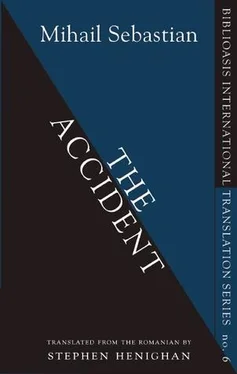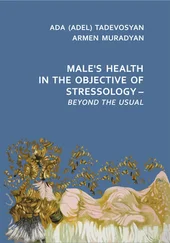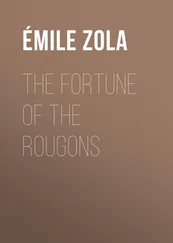“I don’t know, Ann, I don’t know. I think you shouldn’t. I think it’s better if you don’t come.” He spoke these words of resistance aloud, yet he felt that something beyond his own will had replied for him and had accepted. He didn’t know what was going to happen further along and he didn’t even try to imagine possibilities. One thing was crystal clear: Ann was coming.
Maybe she was outside in the street waiting for him right now. Maybe she was looking out the side window of her light blue car in the direction of his window in order to see him appearing there. Maybe she was only waiting for a sign to come upstairs in a few seconds’ time…
She was coming at the last minute, but she was coming. He felt no desire at all to meet her, but neither did he have any will to reject her. Somewhere, beyond all his memories, beyond all the available evidence, his childish yet still vibrant belief persisted that his love was not lost, that an absurd succession of errors and coincidences had disillusioned and separated them, but that everything could be explained, everything could be rediscovered. There was still time, there was still time…
He went to pick up the fallen flowers, and only then did he realize that he was limping, with his left foot in the hobnailed boot and the right one barefoot. The peaked cap, the blue ski suit, the long pants tightened around his ankles with an elastic band, all seemed laughable now.
Enough of this disguise , he thought. He turned towards his work clothes, towards his former life. The game had gone on too long.
He was just about to pick the skis up off of the floor in order to hide them in the bathroom or the bedroom when the telephone rang. It was Nora.
“Don’t forget to bring a clasp knife. Preferably one with a drill. It’s great for the mountains. You don’t need a thermos, I’ve got a really big one. And don’t load up your backpack with stuff you aren’t going to use…”
He tried to interrupt her. He wanted to tell her: Nora, I’m not going, I can’t go; but she continued to give him advice.
“… a big sweater and, if you’ve got one, a woollen vest. Nothing to eat, you understand? Absolutely nothing. I went shopping and got everything we need.”
Then, without a transition, in the same hurried voice in which she had given her departure instructions:
“I sent you two lilac bows. I imagine you’ve received them. I wanted to make you happy. When we stopped in front of the flower shop on Senate Square, you seemed to be staring at the lilac in the window with I-don’t-know-what-kind of sad smile. I wasn’t going to tell you that they were from me, but later I changed my mind. I don’t want you to have to deal with unresolved mysteries just before leaving.”
She hung up, after reminding him that the train left at exactly ten minutes after midnight.
Paul stood still, disoriented and dizzy. For the second time, he would have liked to ask: What are you looking for? What do you want? By what instinct, or stroke of luck, had that woman, whom he had known for twenty-four hours, entered the most secret portals of his life? By what rehearsed coincidence had she taken the place of his lost love at precisely the point where he had hoped to rediscover it?
He held his head in his hands and stood for a long time with his mind blank.
“WE’VE GOT TICKETS TO BRAŞOV!” Nora shouted from a distance when she saw him getting out of the car.
A porter stopped to take his skis from his hand, and he was ready to give them to him when Nora approached him. “Don’t do that. You carry your skis yourself on your shoulders. Who do you think’s going to carry them up the mountain for you?”
She helped him to put on his backpack and showed him how to carry his skis on one shoulder and his poles on the other, with the points crossed behind.
“We’ve got tickets to Braşov, but nothing need stop us from staying in Predeal, or, if you want to, from going farther, in the direction of the Făgăraş Mountains or Bihor. It’s better not to decide in advance. We’ll figure it out on the way.”
He listened to her without resistance, but also without approval. He hasn’t even said good evening to me , Nora thought. She was determined not to take his moods into account.
“Your backpack has to fall straight down beneath your shoulder blade, not hang over your hips.”
As she was adjusting the straps of his backpack on his shoulders, she met, without wishing to, the cold, almost hostile stare with which he was subjecting himself to her advice.
What an obstinate schoolboy stare! Nora thought. Having taught classes of boys, she recognized this uncooperative stare that sometimes rose towards her in defiance from the desks. Be patient , her teacher’s voice murmured to her. We’re going to soften this rebellious face. For the first time she felt sure of herself alongside this man of few words.
The platforms hummed with people. Youthful voices of students and soldiers who were leaving for the provinces gave the whole station a sound of the vacations. Groups of skiers hurried towards the platform where the train to Braşov was leaving. Heavy hobnailed boots resounded on the stones with the regular beat of a march. Among the hurried travellers and the baggage-laden carriages, the skiers separated from one another, jostling each other like so many masts.
At the far end of the platform, next to the engine, were two third-class carriages reserved for skiers. “There’s no place here for civilians,” a boy in a blue jacket on the ladder said to a gentleman in an overcoat and a homburg, who was trying to climb up. Paul listened to the words in silence, and smiled. The boy was right: these two wagons really looked like a military train. Girls and boys dressed in the same clothes, as though in uniform, resembled a young company leaving on manoeuvres. On the last carriage’s ladder, a girl stopped to light a cigarette. For the first time, this gesture struck Paul as lacking in femininity. It was a curt, rushed, soldier-like movement.
“Can you let us get past, miss?”
The girl lifted her head in surprise, looking in his direction, and he glimpsed the glow of her lighter, which was still flickering in her hand. They both burst out laughing. Nora, following behind him, smiled at this first victory: she had finally heard him laugh.
It was a slow night train, resembling a convoy more than a train. It had dozens of carriages which could be heard knocking against each other all the way back to the last carriages, lost in the darkness, whenever the train stopped in who-knew-what nameless station in the middle of the countryside.
“Where are we going? When will we arrive?” He was thankful not to know.
He sat alone by the window with his eyes closed, allowing himself to carried away by the noise of the wheels, which he felt passing through him with the regular beat of a pulse. It was deafening and calming. At times he tried to distinguish a single beat within this din and follow it as it passed with a knocking sound from one carriage to the next, like a wave flowing away.
Suddenly, without any transition in his thoughts, he saw himself on a street corner in Bucharest remembering that it was late and time to go home. He struggled against drowsiness with an acute sensation of pain (no! no! no!) and opened his eyes: through the half-iced-up window he caught sight of the winter countryside and a few sparse trees or houses melting smokily into the night. So I’ve left… So I’ve left , he thought several times, following with his gaze a fixed point in the darkness where it seemed that he might still be able to discern some shred of that which he had left behind. He didn’t know anyone in this skiers’ carriage, but he had the impression that he could speak intimately with all of them. They spoke loudly, they called out to each other by name, they were constantly opening their backpacks to show each other all sorts of utensils and provisions.
Читать дальше












